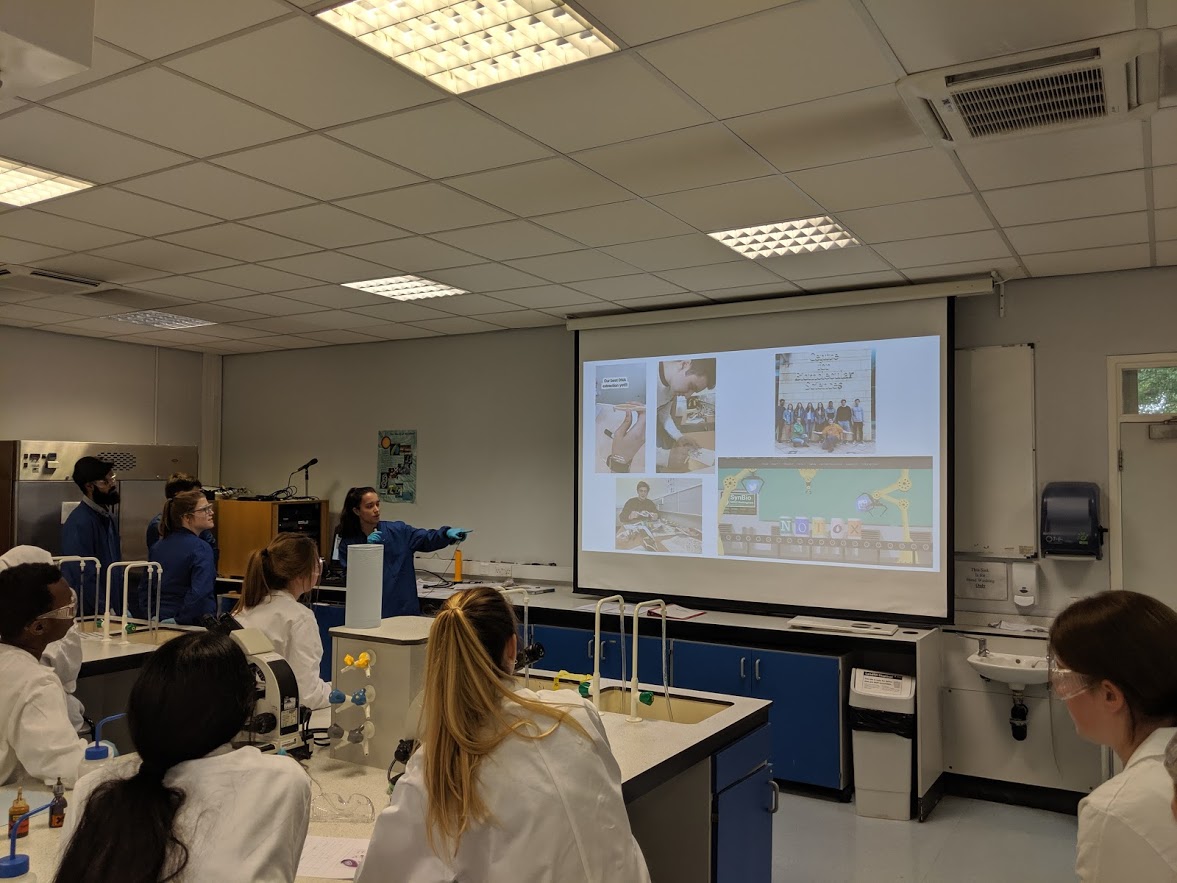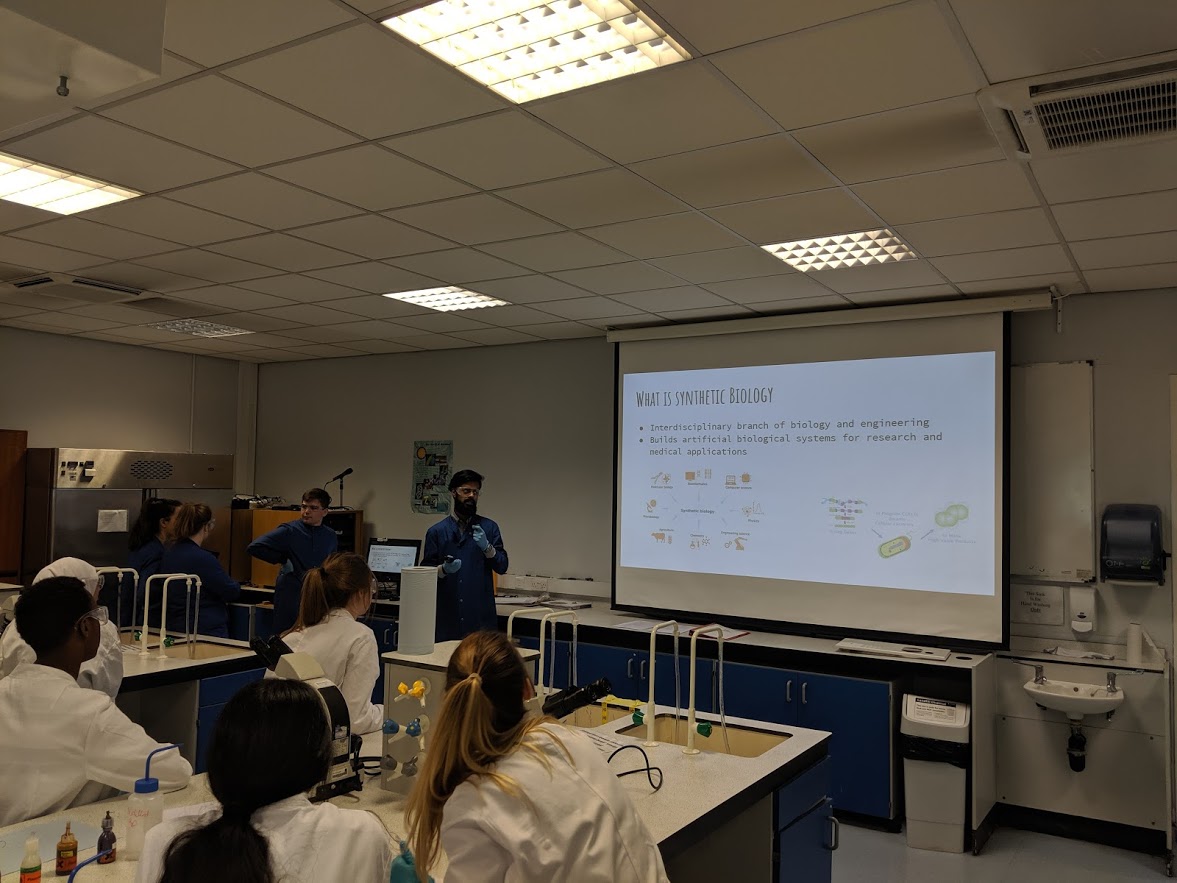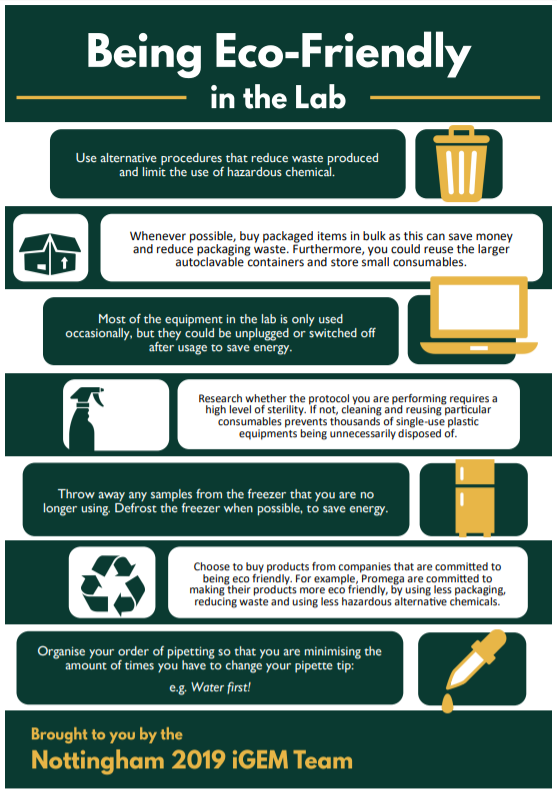

Public Engagement
& Outreach
In order to engage school children and the greater public with synthetic biology concepts, we participated in several events and published multiple articles.


Wonder Festival
15th June 2019
On 15 June, we participated in the biggest University of Nottingham outreach event of the year: 'Wonder'. This annual community open day was held on University Park campus, Nottingham, UK and attracted more than 5000 visitors from the local area.
The event invited families to explore first-hand, the range of research and teaching activities at the University. We had decided before the event that we wanted to provide activities to help young children with a rudimentary level of biological knowledge to learn more in a fun and hands-on manner.

The digital screen on the microscope enabled us to observe the images together, rather than trying to discuss things whilst looking down a microscope eyepiece lens. This resulted in children identifying the same or similar structures across different microscope slides, demonstrating that they had learned and retained the knowledge. We would recommend this type of microscope for learning to other iGEM groups as the children could easily communicate and express what they were seeing.


Our team engaged with around 100 children aged 4-16 years old, as well as their parents and grandparents, showing them microscope-magnified images of plant’s roots, leaves and spores along with different bacteria. The children were then asked to try and identify structures seen on the magnified images, this allowed for communication between the children and us as we discussed the different bacterial parts in the images.

They also were able to create their own origami DNA helixes and as a result, we were able to demonstrate the extraordinary structure and function of the renowned antiparallel DNA strands. Overall, the event was great, we felt we had inspired a future generation of biologists.
Several inquisitive parents asked about our project, giving us the chance to discuss what we would be doing over the summer. This was challenging as we had to explain it in such a way that people from non-science-based backgrounds could understand.
STEM Festival
22nd June 2019
We were invited to attend a STEM festival at a local Nottingham High School on June 22nd. The event was aimed towards secondary school children. Therefore, we knew that we could choose more advanced knowledge-based activities.

Another activity we conducted involved the students creating their own DNA bracelets by converting the letters in their name to the equivalent codons using coloured beads that represent adenine, cytosine, guanine and thymine. This activity helped the students reinforce their understanding of nucleotides and codons in a fun way.

There were several different university students also on different stalls at the STEM festival and they showed an interest in our project, this led to a discussion about the ethics on synthetic biology and what the iGEM competition involves as they had not heard of the event before.

The main activity we conducted was a demonstration of DNA extraction from strawberries. Members of the audience were asked to participate; this experiment allowed them to discuss and learn about the location of DNA in cells and the roles of reagents used in each step required to extract the DNA from those cells. This activity was fun for the children to be part of as they could perform the steps themselves and see the DNA precipitate in front of their eyes. The equipment we used, and reagents were deliberately simplistic so that the children would be able to replicate our experiments at home.

The last activity we carried out involved the children creating model bacteria using plasticine on Petri dishes which they then could take home. This allowed us to open a discussion on good and bad bacteria that exist in the environment and on our bodies, many of the children had not realised that there can be ‘good’ bacteria that contribute to our resistance to diseases. Overall the day was incredibly rewarding; we interacted with around 70 people with a range of ages from young children to their grandparents.
Interactive Lab
11th July 2019
On 11 July we helped a lecturer at the University of Nottingham carry out an interactive lab session. The session allowed us to engage with 40 A level students, aged 17 and 18, who were attending a summer school.


We then gave a talk accompanied by a PowerPoint presentation on our experience of studying biosciences at the University of Nottingham, what synthetic biology is and what our iGEM project involves. This talk allows us to share our own enjoyment for studying a biological degree to hopefully inspire a future generation of scientists.

We then gave a talk accompanied by a presentation on our experience studying biosciences at the University of Nottingham, what synthetic biology and what our iGEM project involves. This talk allows us to share our own enjoyment for studying a biological degree to hopefully inspire a future generation of scientists.

We supervised the students as they performed a Gram-stain test with several different samples of Clostridia. At each step, we questioned what they thought was happening concerning the bacteria’s peptidoglycan and lipopolysaccharide cell layers. These stained samples were then viewed down microscopes that we had set up for them.

Finally, we were able to have a one-on-one discussion with the students on their interests and what they wanted to pursue at university. It also gave us the chance to answer any questions they had about the session; during that time, several students showed an interested in the techniques we had mentioned in our presentation, leading us to discuss how PCR and transformation work.
Pub Quiz
7th August 2019
On the 7th August, we hosted a pub quiz as an outreach event and fundraiser at our local pub: The Johnson Arms, Nottingham, UK.

We chose to organise a pub quiz as we believed it would engage adults who may have lost some interest science. We thought out our questions carefully, focussing on fun or unusual facts to make the overall evening more engaging and enjoyable.
We considered the evening to have been a great success, not only raising funds for our iGEM project but also providing entertainment to around 50 people. In fact, it was so successful that we held a second pub quiz in September!


We advertised the event both in the Centre of Biomolecular Sciences (CBS), University of Nottingham and in the Johnson Arms to include both work colleagues and the public. Consequently, we anticipated a fairly high level of scientific prowess in the room. As such, we designed a science round to really challenge them. Questions included the origins of the autoclave, past Nobel prize winners and quorum sensing molecules.

Press and Radio
August - October 2019
We have been working hard in order to raise the awareness of synthetic biology, iGEM and our project. We targeted local and regional media outlets including local newspapers, magazines and the radio. We wrote press releases that discussed previous botulism outbreaks and the financial cost for companies to be associated with botulism, the iGEM competition and what our project entails.

We also were published in the University of Nottingham’s student paper – the 'Impact Magazine'. This paper is printed in its thousands every month and is written by Nottingham students with the articles being aimed at fellow university students. After a successful response to the first article, they are also interested in a follow-up article discussing our adventure to Boston for the Jamboree. A publication in the “Impact Magazine” allowed us to reach and inform students from not only the Nottingham campus with the physical copy, but also the University of Nottingham students at the Chinese and Malaysian campuses as it was also featured on the “Impact Magazine” online.
We then contacted the 'Microbiology Society' about our recent publication in the “Impact Magazine”, who then retweeted our twitter post about the event. The Microbiology Society have an impressive influence with their 38,000 followers.

Consequently, we were published in 'Nottingham Local News' and 'Notts in Focus' (Issue 337, Page 4), which are both printed journals with local demographics in the Nottinghamshire area. Together, they impressively distribute over 50,000 copies monthly. We contacted these regional papers with the aim to educate and enlighten a diverse range of people who might not necessarily come from a science background with our project.

'The Biologist' is a bi-monthly magazine published by the Royal Society of Biology, the magazine is sent by post to its 17,000 strong network of professional and student bioscientists. We were very happy to write a longer and more detailed article discussing how Clostridium botulinum was first discovered, for this more specialised readership. It will be printed in their December 2019 issue.

It was Ada Lovelace Day, 8th October, when we were invited to an interview with Carson Wishart, the host of the drive time show on BBC Nottingham radio. The interview involved a discussion about our project, the iGEM competition and women in science. Figures show that BBC Nottingham has a weekly audience of 178,000 and the drivetime programme is the most popular. Click here to listen to Saniya and Alice on the radio (Timestamp: 1:20h)!
Posters and Board G`ame
August - October 2019
Eco-Friendly Poster:
As an eco-conscious group of people working in science, we are aware of the environmental impact of lab work. Therefore, we wanted to create a poster promoting more eco-friendly practices in the lab. After some research we collated several suggestions and pieces of advice that we aim to follow in our own lab and hope to inspire others to do so in theirs. The information given includes buying consumables in bulk, turning off unused lab equipment and organising samples in freezers. Click below to open the printable Eco-friendly poster and share it will your fellow lab colleagues.

Eco-Friendly Poster

Build a Bacterium Board Game:
We created a board game intending to advance synthetic biology education in younger generations. The game allows players to become scientists, synthesising their own bacteria, integrating plasmids to make them more resistant to negative situations. The best adapted and most developed bacterium will be able to reach the centre of the board first, and will subsequently be awarded the Noble prize in Physiology or Medicine. The game encourages players to learn about bacterial properties in a fun and engaging way. Click below to download the board game and pieces for the chance to win your own Nobel prize!

Build a Bacterium Board Game

Food-Safety Poster:
Our project focuses on the prevention of the deadly food poisoning disease, botulism. As this is a Proof of Concept project which we hope to develop in other organisms we have been researching other foodborne illnesses. Through our research we learnt about ways of preventing contracting them and decided to collate all this information in a food safety poster. We realised some of these prevention tips were unknown to many university students who were cooking for themselves for the first time. Points discussed include cooking meat correctly, washing hands and how to store food properly. The poster has been sent to and distributed by the University of Nottingham’s Student Union so it can be found in student halls at the start of term. Click below to open the printable poster and share it with your house or flatmates.

Food-Safety Poster













